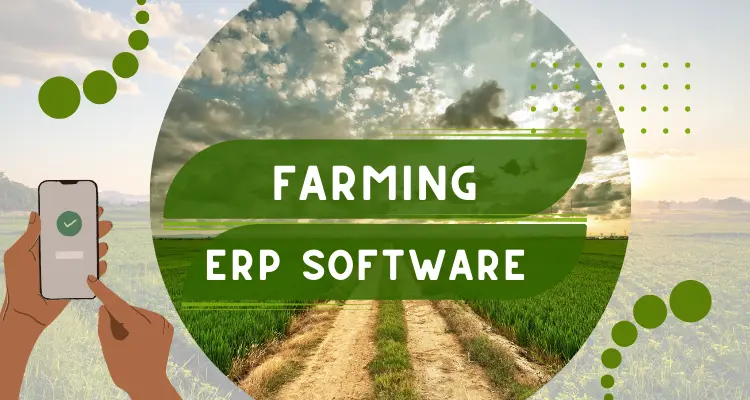
In the digital age, the future of agriculture lies in the adoption of technology. One such technology that is making waves in the sector is ERP software. The features and benefits of best ERP software in Pakistan are revolutionizing the way farming is done, leading to increased efficiency and profitability.
Problems in agriculture sector in Pakistan
Pakistan’s agriculture sector is grappling with numerous challenges that hinder its growth. These include a lack of irrigation facilities, low crop yields, unfair distribution of resources, and outdated farming methods. Climate change further exacerbates these problems, impacting major crops like wheat, rice, cotton, sugarcane, and maize. Additionally, the slow adoption of information technology and limited access to capital add to the woes of the sector.
Furthermore, the sector faces a significant production gap due to reliance on conventional farming methods and a lack of innovative technology. This has led to an annual loss of $1 billion in just three major crops because of poor-quality seeds and outdated methods. The land, which is becoming increasingly infertile due to salinity and water-logging, is another major concern.
The unfair distribution of resources adds to the problem, leading to a broken supply chain that further hampers growth. The situation is worsened by the fact that Pakistan’s agricultural sector and potential are significantly disrupted by climate change. From 2000 to 2019, climate change has had a noticeable impact on the country’s major crops.
The combination of these factors has resulted in a distressed agricultural sector in desperate need of revival. By addressing these issues, there is potential for the sector to bounce back and contribute significantly to Pakistan’s economy.
How agriculture ERP software is overcoming challenges?
The good news is that agriculture ERP in Pakistan is helping overcome these challenges. It bridges the gap between traditional farming methods and modern technology, thus boosting productivity. For instance, it aids farmers in managing their crops better by providing real-time data on weather conditions and soil health. This enables timely interventions, reducing the risk of crop failure.
In terms of financial management, ERP software simplifies billing and pricing processes, making them more transparent and efficient. It also eases the process to buy agriculture ERP in Pakistan, thereby promoting wider adoption.
However, the journey is not without hurdles. The challenges in implementing agriculture ERP in Pakistan include resistance to change, lack of digital literacy among farmers, and high initial costs. Despite these obstacles, the benefits of agriculture ERP in Pakistan far outweigh the challenges, making it a worthwhile investment for the sector.
Moreover, agriculture ERP software addresses the challenge of coordinating the supply chain effectively. It helps in managing production efficiently by scheduling employees and equipment according to the farming seasons and demand. As per a report by Nextec Group, this coordination is essential for agricultural productivity and profitability.
Another significant way that agriculture ERP software is overcoming challenges is by providing solutions for environmental issues. The software helps farmers understand and adapt to changing weather patterns, thereby mitigating the impacts of climate change on crop yields. According to research published on ScienceDirect, such adaptations are crucial for the sustainability of the agricultural sector.
In terms of overcoming resistance to change, agriculture ERP software providers are offering training and support to facilitate the transition. This includes multilingual support to cater to a diverse user base, thereby removing language barriers and promoting wider adoption.
Features of agriculture ERP software
Agriculture ERP software comes packed with an array of features designed to streamline farming operations:
70+ Analysis Criteria: ERP software provides over 70 analysis criteria, enabling farmers to make data-driven decisions. These criteria range from soil health and weather patterns to crop yield and pest infestation, providing a comprehensive view of farm operations.
Manage Your Crops: From sowing to harvesting, ERP software assists in every stage of the crop cycle. It helps plan planting schedules, monitor crop growth, manage labor resources, and even schedule harvesting, ensuring optimal yield and quality.
Crop Cycle: It allows farmers to keep track of each crop’s growth stage, ensuring timely care and intervention. This feature is critical in planning fertilization, irrigation, and pest control measures at the right time to maximize crop health and productivity.
Location, Disease, Fertilizer: ERP software aids in mapping crop locations, identifying diseases early on, and managing fertilizer usage effectively. This feature allows for precise application of inputs, minimizing wastage and maximizing efficiency.
Plant Analysis, Water Analysis, Soil Analysis: These features provide insights into plant health, water quality, and soil condition, enabling better crop management. With this information at their fingertips, farmers can make informed decisions about irrigation, fertilization, and pest control.
Soil Texture, Weather: Understanding soil texture and weather patterns is crucial for successful farming. ERP software provides this information at the click of a button. This helps farmers choose the right crops for their soil type and plan their farming activities around the weather forecast to minimize risk and loss.
Sales And Purchase, Billing, And Pricing: ERP software simplifies financial processes, ensuring transparency and efficiency. It manages everything from inventory and sales tracking to invoicing and payments, reducing administrative burden and allowing farmers to focus more on their core farming activities.
On-The-Fly Customizations: The software allows for instant customizations as per the farm’s needs. Whether it’s adjusting the layout of farm plots or modifying input quantities, farmers can easily tailor the software to their unique needs.
Multilingual Agriculture ERP Software: To cater to a diverse user base, the software supports multiple languages. This ensures that even farmers who are not fluent in English can use the software with ease, thus promoting wider adoption.
Conclusion
Farming with ERP is set to redefine the future of agriculture in Pakistan. By addressing the sector’s challenges head-on, it paves the way for a more prosperous and resilient agriculture industry. As more farmers embrace this technology, the dream of a thriving, technologically advanced agriculture sector in Pakistan is not far from becoming a reality.


